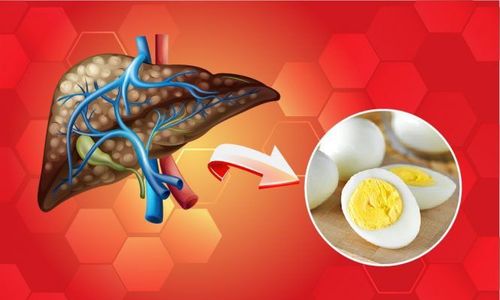This is an automatically translated article.
Most of us know that eating eggs is very healthy. Not only that, they are also an extremely rich source of high-quality protein. Adequate protein intake is important for building muscle and bones, as well as maintaining overall good health. Besides the impressive protein content, this food is low in calories and many other nutrients, especially suitable for those who want to lose weight. So how much protein does an egg contain?
1. How much protein does an egg contain?
Normally, a medium sized egg will contain about 6-7 grams of protein. However, to determine the specific protein content in 1 chicken egg, we need to be based on its size. Here are the protein amounts according to different sizes of chicken eggs, including:
Small eggs (38 grams): Contains about 4.9 grams of protein Medium eggs (44 grams): Contains about 5.7 grams of protein Eggs large chicken (50 grams): Contains about 6.5 grams of protein Extra-large chicken eggs (56 grams): Contains about 7.3 grams of protein Jumbo chicken eggs (63 grams): Contains about 8.2 grams of protein According to nutrition experts The average sedentary adult male needs about 56 grams of protein per day, and the average sedentary adult woman needs about 46 grams of protein per day, according to the Health Care Department.
2. Protein content of egg white and yolk
Many people often think that the amount of protein in an egg can only be found in the egg white. Meanwhile, the egg yolk is considered to be the place where most of the nutrients and fats are stored. However, in addition to these nutrients, the yolk also contains up to half of the protein content in eggs.
One large egg contains about 7 grams of protein, specifically:
Protein in egg white: 4 grams Protein in egg yolk: 3 grams Therefore, you should eat the whole egg to be able to Get the most protein and other nutrients.

Lượng protein trong trứng là khoảng 6 – 7 gram protein
3.Does cooked eggs affect protein quality?
The amount of protein in chicken eggs contains all 9 essential amino acids in the right ratio. However, the amount of protein the body actually gets seems to depend on how the egg is prepared.
Eating raw eggs gives you only a small amount of protein. Several studies have evaluated the amount of protein absorbed from cooked eggs compared to raw eggs and found that participants were able to absorb up to 90% of the protein in cooked eggs and only 50% of the protein from raw eggs.
Another study has also found that healthy people who eat cooked eggs can absorb 94% of protein, while only about 74% of protein from raw eggs.
This suggests that cooked eggs will make the protein easier to digest and more accessible to your body. In addition, eating raw eggs also has potential health risks such as bacterial infection or food poisoning.
4. What are the health benefits of eggs for the body?
Eggs are a staple in many healthy diets. It can be flexibly incorporated into many different dishes, especially since they are rich in nutrients.In the past few decades, eggs have been considered a "villain" food due to their high cholesterol content. This causes many people to give up egg consumption and even risk choosing egg substitutes. High cholesterol levels in the blood are strongly linked to heart disease, researchers say, but the cholesterol content in eggs and other foods is not the main culprit. In fact, saturated fat has a much larger effect on your blood cholesterol levels.
Eggs are one of the healthiest and most nutritious food sources that you should eat regularly. It's relatively low in calories, with an average hard-boiled egg containing only about 77 calories. Although low in calories, eggs are considered a balanced source of most of the nutrients your body needs. One of the most typical nutrients in eggs is choline, which is easily deficient in the diet.

Lượng protein trong trứng nấu chín sẽ dễ tiêu hoá hơn
Choline is important for many body processes. In fact, a choline deficiency can seriously affect heart and brain health, and is linked to an increased risk of neural tube defects during pregnancy.
Besides containing many valuable nutrients, eggs also provide many other health benefits such as weight loss and weight maintenance. It has been shown to promote satiety, helping you prevent overeating. This effect is especially beneficial for those who eat eggs for breakfast.
Eating eggs for breakfast can help you eat significantly less over the next 24 hours than other types of breakfast without eggs and high in calories. In a recent study, men who ate eggs for breakfast consumed 470 fewer calories for lunch and dinner than men who ate cereal or croissants for breakfast.
Similar to milk, the amount of protein in 1 chicken egg has the highest biological value, reaching the gold standard in nutrition. One egg has only about 75-77 calories but has up to 7 grams of high-quality protein, 5 grams of fat along with other important vitamins, iron, carotenoids and minerals.
Eggs can provide disease-fighting nutrients like zeaxanthin and lutein. These carotenoids may reduce the risk of age-related macular degeneration, one of the leading causes of blindness in older adults.
Overall, the full health benefits of eggs can only be obtained when you store them properly (in the refrigerator) and cook them thoroughly to kill any potential bacteria.
Follow Vinmec International General Hospital website to get more health information, nutrition knowledge, beauty to take care of yourself and loved ones in your family.
Please dial HOTLINE for more information or register for an appointment HERE. Download MyVinmec app to make appointments faster and to manage your bookings easily.
Reference sources: webmd.com, healthline.com












